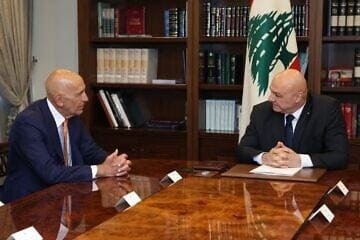American Ambassador Thomas Barrack has introduced two potentially dramatic shifts to break the impasse and lead the parties to an agreement.
Jacques Neriah
(JCFA via JNS)
The issue of disarming Hezbollah in Lebanon has reached a deadlock. The Lebanese government, including President Joseph Aoun, has concluded that it is unable to compel the defiant Shi’ite militia to surrender its arsenal to the state, as stipulated in the ceasefire agreement with Israel, based on U.N. Security Council Resolution 1701.
Enforcing such a demand would likely lead to an open clash with Hezbollah and risk plunging Lebanon into another civil war.
Hezbollah has strategically aligned itself with Aoun’s position, demanding an early Israeli withdrawal from five strategic positions in southern Lebanon before any discussion of its own disarmament.
Israel, conversely, insists on the opposite: Hezbollah must disarm before any Israeli withdrawal. Hezbollah argues that as long as Israel occupies Lebanese land, its weapons remain necessary to confront Israel.
Moreover, Hezbollah has stated its willingness to consider surrendering its weapons, but only as part of a negotiated agreement with the government involving a “joint defense strategy.” Otherwise, Hezbollah claims, disarming would be tantamount to surrendering to Israel.
Hezbollah MPs and the terror group’s leader Naim Qassem have publicly and unequivocally declared that they will never submit their weapons to the Lebanese state, asserting that their arms are intended for renewed confrontation with Israel.
Since November 2024, several options have been explored. The idea of integrating Hezbollah units into the Lebanese army—similar to how other militias were integrated following the 1990 Taif Agreement—has been rejected by both the United States and Aoun.
This approach was dismissed due to fears that it could lead to a Hezbollah takeover of the army and drastically alter its character. The Syrian model—wherein 3,500 militia members were incorporated into a restructured Syrian army with U.S. acquiescence—was also considered and dismissed.
The Lebanese Army remains financially supported by the United States and Qatar, and there is no intention of allowing Hezbollah fighters—funded by Iran—to receive an additional salary stream. Doing so would, in effect, be “feeding your own enemy.”
For months, American envoys have engaged in discussions regarding Hezbollah’s disarmament. Former U.S. Deputy Envoy to the Middle East Morgan Ortagus took a confrontational approach, demanding a detailed timetable from the Lebanese government for Hezbollah to surrender its weapons. The Lebanese government tried to sidestep this pressure, which included three U.S.-proposed options:
- Disarm Hezbollah according to a clear timetable (which did not happen).
- Dismantle Hezbollah’s financial arm, the Qard al-Hassan institution (which also did not happen).
- Begin disarming the 12 Palestinian “refugee” camps, with a process scheduled to begin on June 15 in the three main camps around Beirut (which also did not happen).
Ortagus, labeled the “ugly American” by Druze leader Walid Jumblatt, was replaced by Thomas Barrack, the U.S. Ambassador to Turkey and of Lebanese descent. Barrack adopted a different tone. Instead of demanding a timetable, he sought (and obtained) the Lebanese perspective on how disarmament might proceed. Rather than applying pressure, Barrack emphasized that Lebanon must find its own solution to the Hezbollah issue.
However, he introduced a new threat: Without a solution to Hezbollah’s armament, Lebanon could become part of Bilad al-Sham (Arabic for “the Levant”), a reference to historical Syrian ambitions over Lebanon. This rhetoric caused widespread panic, especially amid rumors that Lebanon’s northern city of Tripoli and parts of the northern Bekaa Valley might be handed over to Syria.
Barrack introduced two potentially dramatic shifts in the U.S. position:
- Differentiating Hezbollah’s wings: Barrack suggested distinguishing between Hezbollah’s political and military wings. Until now, both wings have been treated as part of a unified terrorist organization—a stance reaffirmed by the State Department spokesperson following Barrack’s remarks. Making this distinction could pave the way for direct U.S.-Hezbollah negotiations, similar to the U.S. engagement with Hamas.
- Selective disarmament: More significantly, Barrack indicated that the U.S. and Lebanese governments were mainly concerned with Hezbollah’s weapons that threaten Israel.
This implies that Hezbollah could retain other arms—an approach that might offer both Hezbollah and the Lebanese government an honorable exit from the current impasse.
Originally published by the Jerusalem Center for Security and Foreign Affairs.
Image: U.S. Special Envoy for Syria Thomas Barrack (left) and Lebanese President Joseph Aoun at the presidential palace in Baabda, east of Beirut, on July 7, 2025. Credit: Lebanese Presidency Press Office.


